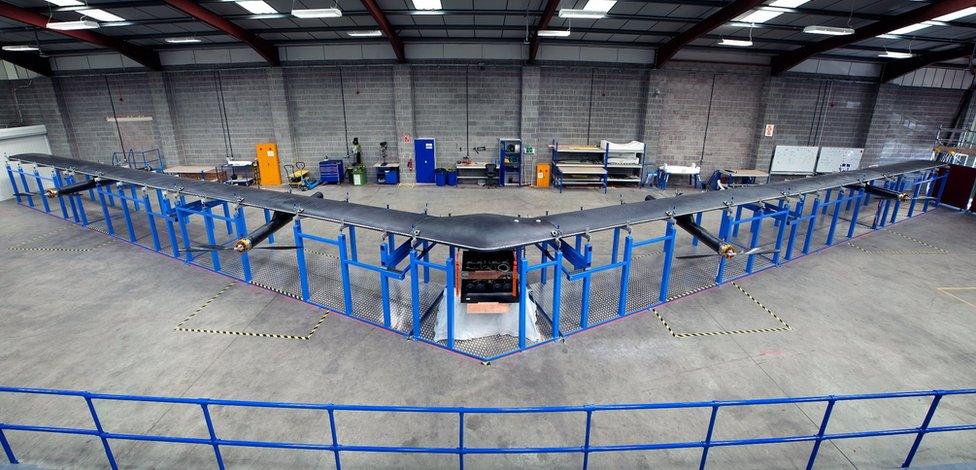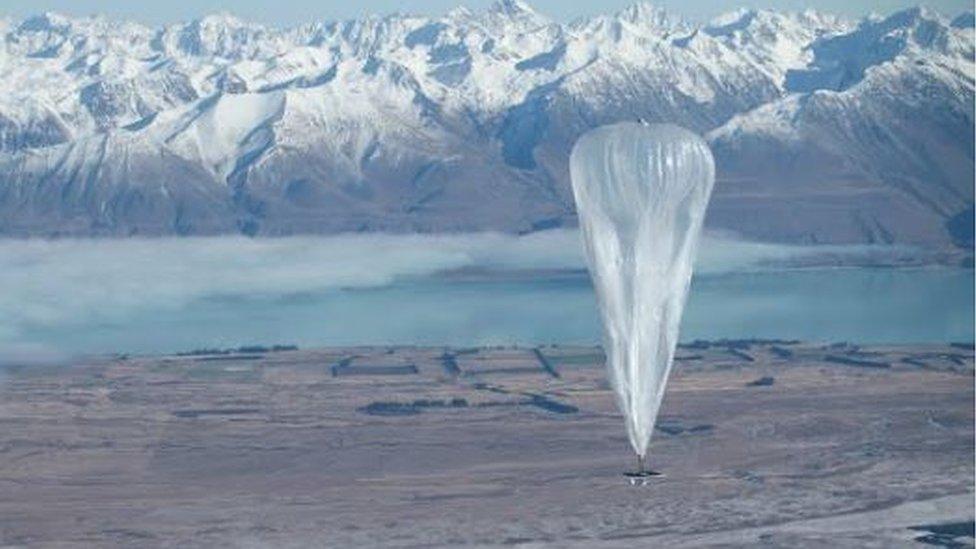Tech Tent: Facebook's drone falls to earth
- Published
Back in 2016, it looked like the Aquila drone was well on its way
Two years ago I took a trip to a warehouse in Bridgwater in Somerset to visit a somewhat unlikely outpost of the Facebook empire.
Inside the warehouse was a giant wing - a solar-powered drone designed to stay airborne for three months, beaming an internet connection to people in remote places.

Stream or download, external the latest Tech Tent podcast
Listen live every Friday at 14:00 GMT on the BBC World Service
Facebook had snapped up a tiny British firm specialising in solar-powered aircraft a couple of years earlier and that firm was now at the heart of Project Aquila - Facebook's mission to bring the miracle of connectivity to people in developing countries.
The social network's head of engineering Jay Parikh had flown over from California to explain the extent of his firm's ambitions, telling us "our mission is to connect everyone on the planet".
The future?
The giant drone was even chosen this year by London's Victoria and Albert museum as the centrepiece of a new exhibition called The Future Starts Here., external
But this week the plug was pulled. Facebook announced that the Bridgwater factory had closed and the team building the drone had left the company.
This was revealed a long way down a blog, external that spent most of its time describing the progress made by the project - only to conclude that other companies build these kind of aircraft, so Facebook may as well work with them instead.

The first Aquila drone was designed and built over a 14-month period
The company insists that Project Aquila is not dead, and the work on areas such as the battery technology needed to keep a drone airborne will continue.
But this looks like a big setback, particularly when you consider that Google's Project Loon, which uses high altitude balloons in a similar connectivity mission, has made far more progress.
"Clearly they have failed at a technical level," says Ken Banks, who has spent many years working on mobile technology in developing countries.
"They have faced reality and realised that maybe the technical choice they've made isn't the right one."
He points out that Google's Project Loon has had many hours of flight time. By contrast, Project Aquila had only a handful of test flights, one of which ended with the drone being damaged.

Google is using balloons, not drones, in its attempt to bring the internet to less-connected parts of Earth
But he says the tech giants may not have as big an impact in the short-term as local companies using more basic technologies such as wi-fi:
"There are African companies and organisations already rolling out solutions to the connectivity problem.
"It's just not currently at the scale that perhaps the bigger world players want to see, but it is happening - people are being connected today."
A Facebook executive told me this week that all sorts of issues of regulation and technology had to be sorted out and it could be many years before ambitious schemes like Project Aquila start connecting people. What if Google got there first, I asked.
That would also be OK as long as people got connected, he told me. But I think I could hear the sound of gritted teeth on the line from California.
Also on the podcast this week:
We talk to Basma Ali and Rasha Abu-Safieh from GGateway, a Gaza start-up helping IT graduates to find work remotely. And there's discussion of Globechain - a firm helping large corporations share old IT equipment with start-ups, charities and schools around the world.
Stream or download, external the latest Tech Tent podcast
Listen live every Friday at 14:00 GMT on the BBC World Service
- Published27 June 2018
- Published1 June 2018
- Published30 June 2017